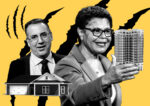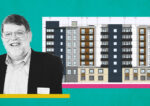An emergency order by Los Angeles Mayor Karen Bass to create more affordable housing is displacing residents from rent-controlled apartments who can’t afford to move.
Scores of residents have to relocate in the wake of Executive Directive 1, the mayor’s initiative to speed up the construction of affordable homes, the Los Angeles Times reported.
The directive’s fast-track approvals are credited with speeding up the review of more than 9,000 new apartments classified as “affordable,” with certain rent caps.
Bass wants to make the initiative permanent, turning the emergency order into a law that would eliminate public hearings, and some time-consuming review, for projects deemed 100 percent affordable.
But renters’ rights groups say the city first should enact more safeguards to protect tenants.
They include one South L.A. couple, immigrants from Guatemala, who face eviction from their rent-controlled granny flat, which will be demolished to make way for an affordable housing project.
While eligible for nearly $25,000 in relocation payments, they’ve found L.A. apartments are either too expensive or don’t allow dogs.
Maria Patiño Gutierrez, who handles land-use policy for the nonprofit Strategic Actions for a Just Economy, said her group is especially worried about the loss of apartments regulated by the city’s rent stabilization ordinance, which limits the amount of rent increases in older apartment buildings.
If the mayor’s program becomes permanent, she said, the number of low-cost apartments targeted for removal will continue to climb — especially in South L.A.
“Folks are going to get pushed out of their neighborhoods,” Patiño Gutierrez told the Times.
Los Angeles tenant protections are considered among the strongest in the nation.
But renters’ rights groups want the city to do more to ensure that low-income renters whose homes are replaced by affordable housing aren’t forced to move miles away to less expensive areas such as the Antelope Valley or the Inland Empire.
Those tenants should have access to an apartment in one of the new affordable projects that are built in their communities, advocates say.
Bass took note of the concerns expressed by tenant advocates, and is carrying out an assessment of her fast-track strategy.
In an interview, she said her team will look for more ways to protect low-income renters as the city accelerates the production of affordable homes.
“Now that this has come to our attention, we are going to take a microscope to the program,” Bass told the Times. “The goal of this is for people to live better, not to hurt people.”
Executive Directive 1 may rank among the top successes of Bass’ year-old administration. From January through September, developers applied to build more than 12,000 affordable units, nearly double the amount proposed during the same period the previous year, city officials said.
More than 9,000 units have been proposed in projects deemed 100 percent affordable, which developments are expected to result in the demolition of 195 rent-controlled units across the city, the mayor’s team said last month. For every rent-controlled apartment unit being bulldozed, 46 new affordable housing units are proposed to replace them, according to the Times.
The mayor took heat from San Fernando Valley homeowners last fall when the mayor’s Executive Directive 1 allowed for eight apartment complexes up to 80 feet tall next to homes in five single-family neighborhoods in Sherman Oaks, Canoga Park, Reseda, Pacoima and Sun Valley. It was revised later to bar apartments on single-family streets.
— Dana Bartholomew
Read more



